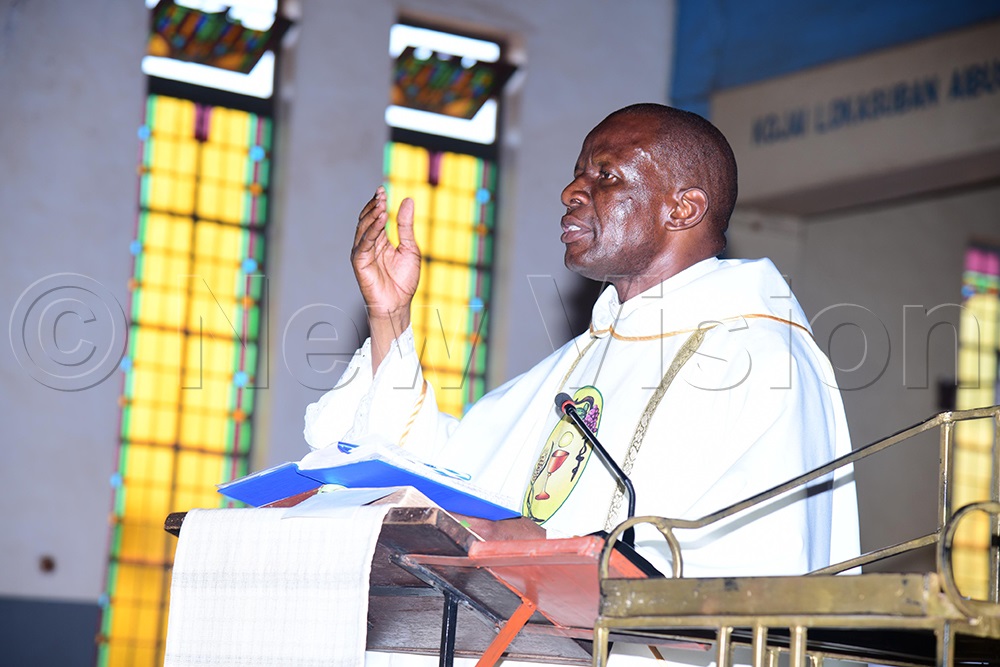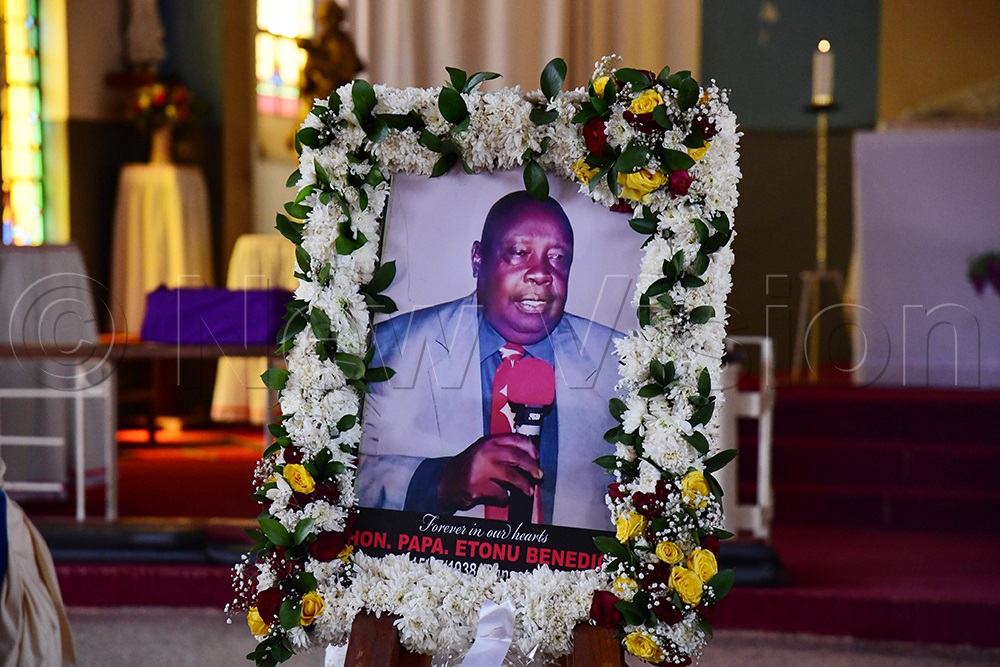Amuria bids farewell to Ben Etonu, ex-Obote II minister and pioneer MP
Before joining the National Resistance Movement in 2000, Etonu was a prominent member of the Uganda People’s Congress. During the Obote II government, he served as minister of housing, a position that placed him at the centre of national governance during a turbulent political era.
Girigori Mikairi Egunyu, former LC5 Soroti district (left), who worked with Etonu, who was serving as Soroti RDC, viewing the body after the mass. (Credit: Godfrey Ojore)
________________
A solemn requiem mass was held on Wednesday, 26 November, at the Immaculate Conception Cathedral in Soroti city in honour of former Amuria County Member of Parliament and one-time minister of housing under President Milton Obote, Ben Etonu, who died on November 15, 2025, in Kampala at the age of 87.
The service, celebrated by Fr Robert Amoni, drew relatives, friends, in-laws and government leaders, including Soroti City resident city commissioner John Michael Okurut. The cathedral, silent except for hymns and prayers, reflected the deep respect many held for a man whose political career spanned some of Uganda’s most defining decades.
Fr Robert Amoni of Immaculate Conception Cathedral delivering the homily. (Credit: Godfrey Ojore)
In his homily, Fr Amoni urged Christians to honour God and devote time to spiritual life, reminding the congregation that “God remains the ultimate protector of His people.” He praised the late Etonu for his disciplined and humble service, saying the former legislator lived a life that demonstrated commitment to country and community.
Before joining the National Resistance Movement in 2000, Etonu was a prominent member of the Uganda People’s Congress. During the Obote II government, he served as minister of housing, a position that placed him at the centre of national governance during a turbulent political era.

The portrait of Mzee Ben Etonu a former Obote II minister of housing and former Amuria county MP. (Credit: Godfrey Ojore)
To many in Amuria, however, his legacy is most visible in the local projects he championed. Elder Francis Edison Echodu remembered him as “a leader of action,” noting that Etonu fulfilled campaign promises such as lobbying for the establishment of a health centre, improving road access and securing sub-county status for Abarilela.
Similarly, Girigori Mikairi Egunyu, former LC5 chairperson of Soroti district, who once served alongside him when Etonu was resident district commissioner, credited him for mentoring young leaders.
“He retired after grooming people who replaced him adequately,” Egunyu said. “He did not fight them while on retirement but chose to live a quiet life until his demise.”
Etonu’s parliamentary career included active participation in some of the most consequential debates in Uganda’s recent political history. One such moment came on June 23, 2005, when Parliament held a tense session on the proposal to scrap presidential term limits ahead of the 2006 general election.
As a ruling party MP at the time, Etonu made a spirited submission in support of removing term limits, arguing that Uganda required continuity under a tested leader.
Drawing from his memories of pre-1986 adversarial multi-party politics, an era he said was characterised by hostility among MPs who “could not even share tables,” Etonu credited the Movement system with fostering unity and cooperation in governance.
“We need continuity,” he told the House. “Uganda still needs the current leadership to lead us through the transition. We cannot afford to let a new president mess us up after 20 years of leadership.”
His remarks were quickly interrupted by Rubaga South MP Ken Lukyamuzi, who rose to offer “information,” prompting a sharp exchange. Etonu dismissed the intervention, arguing that Lukyamuzi lacked the historical experience necessary to appreciate his position, a comment that drew a point of order from Lukyamuzi, who accused him of seeking attention.
Speaker Edward Ssekandi stepped in with a light-hearted remark that eased the tension: “I thought it is a compliment for you to want to be heard by your constituents,” he said, reaffirming that every MP had a right to be listened to.
In the remainder of his submission, Etonu stressed the importance of stable leadership for economic progress, including Uganda’s achievement of debt relief. He questioned why presidential tenure should be restricted when previous presidents had never completed two full terms. Concluding, he stated: “People of Teso need President Museveni to continue until the middle class has developed so that he can hand over to them.”
Two decades later, the NRM continues to rally behind Museveni, now in the midst of another election cycle, an enduring political trajectory that mirrors the continuity Etonu defended on the floor of Parliament.
Etonu’s death came just two weeks after President Museveni visited Amuria, although the former legislator, who was already unwell, was unable to meet him. His passing closes the chapter on the life of Amuria’s longest-serving MP, having represented the county for 23 years before being succeeded by Musa Francis Ecweru, who has now served for almost 20 years.
Ecweru’s attempt to make a political comeback in 2026 ended earlier this year when he lost the NRM primary to secondary school teacher Samuel Ediau.
After retiring from public service, Etonu returned to his home in Amucu, Amuria district, where he lived quietly until his death. He will be laid to rest on Saturday, November 29.